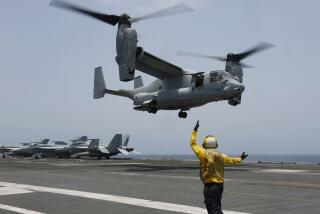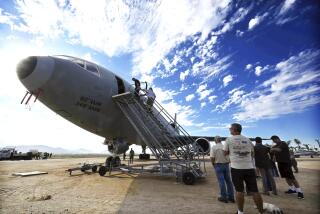Court-Martial Urged for Pilots in Italy Tragedy
- Share via
WASHINGTON — In what could become one of the most dramatic episodes in military legal history, a Marine Corps judge has recommended that a pilot and his navigator be court-martialed in the deaths of 20 people killed when their jet struck the lines of an Italian gondola and sent a crowded cable car plunging to the ground last winter, sources said Wednesday.
The recommendations, which now will be reviewed by a Marine Corps general, come after an exhaustive internal investigation and several days of preliminary hearings into the Feb. 3 tragedy that ratcheted up political tensions between this country and Italy.
Under the recommendations, the pilot, Capt. Richard Ashby, 31, of Mission Viejo, Calif., and his co-pilot and navigator, Capt. Joseph P. Schweitzer, 30, of Westbury, N.Y., would be court-martialed for negligent homicide, dereliction of duty and destruction of government property.
If court-martialed and convicted, the two pilots could be sentenced to life in prison--a punishment that many military observers said would be unusually harsh if the aviators never intended to hit the cable car wires.
The Marine Corps judge has recommended that Capt. William L. Raney II, 26, of Englewood, Colo., and Capt. Chandler P. Seagraves, 28, of Nineveh, Ind., not be charged in the deaths. They were sitting in the back seat of the plane and, at hearings this spring, insisted that they were never in control of how fast or low the plane was flying.
Ashby, in a telephone interview Wednesday evening from his home in Atlantic Beach, N.C., said he expects to receive official word on the findings this morning.
“I’m hanging in there,” he said. “It’s just that we knew in all likelihood we were going to a court-martial. We expected it.
“But it’s still unjust. And when people I know look at me and say I’m down, well, of course, I’m not very happy about this.”
The recommendations were made by Lt. Col. Ronald L. Rodgers, a military judge who oversaw the hearings in Camp Lejeune, N.C. It is now up to Lt. Gen. Peter Pace, commander of Marine Corps forces in the Atlantic region, to decide whether the case should go to court-martial.
A senior military official in Washington said Wednesday night that, although Pace “is going to take his time” in reviewing the case, a court-martial could be convened as early as this fall.
Crucial to Pace’s decision will be whether Ashby purposely and recklessly was flying at an altitude of under 500 feet and at speeds far too fast.
Ashby joined the Marine Corps 10 years ago after growing up in the shadow of the El Toro Air Station, where he dreamed of some day flying military jets.
In an interview with The Times in May, the first he gave after the collision, Ashby strongly defended his actions that day in Italy. He said he was not “hot-dogging” his EA-6B Prowler jet, and he produced aerial flight maps he had been given that do not show any markings for the gondola.
He also maintained that he was flying at a pre-approved altitude-- albeit below the normal 2,000-foot mark. He declined to discuss allegations that he was flying too fast.
The Prowler is designed to fly low and serve as a cover for other attack aircraft.
Ashby also said in May that he believes he is being made a scapegoat by the military and the Clinton administration in an effort to ease anger by Italian authorities and their demands for a political accounting.
And he expressed deep remorse for the tragedy, crying several times during the interview.
“I have faith in God and I have faith in the Marine Corps,” he said. “If it was not for that faith, then I could not get through this. Faith is what keeps me going.”
Ashby said he thought he had hit a bird and, when he banked his plane over the Dolomite Mountains in northern Italy, he immediately worried about his crew.
He managed to return the aircraft safely to Aviano Air Force Base in Italy, believing that he was something of a hero because none of his crew was injured. Then he learned what actually had happened, he said.
The collision caused a political firestorm in Italy and strained the relations of North Atlantic Treaty Organization allies who for years have used military bases in that country.
So angry were Italian authorities that some in that government demanded the United States immediately get out of Europe. Some officials there hope to force all four Marine Corps aviators to stand trial in Italy regardless of what happens in the U.S. military justice system.
Reacting to the harsh rhetoric in Italy, U.S. officials have publicly apologized to Italy and have promised to pay reparations to the families of the victims.
More to Read
Sign up for Essential California
The most important California stories and recommendations in your inbox every morning.
You may occasionally receive promotional content from the Los Angeles Times.











